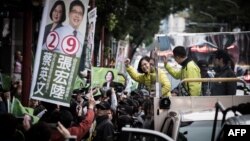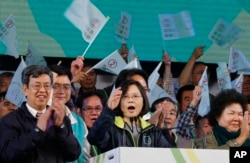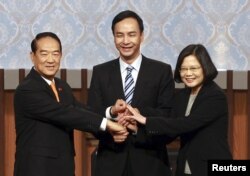Taiwan’s anti-China opposition party is holding its lead ahead of Saturday's pivotal presidential election even as the ruling Nationalist Party gains ground. The opposition’s edge in opinion polls reflects popular discontent in Taiwan about how the current president has handled improved ties with old rival China.
Taiwan’s ruling Nationalist Party has gained international recognition by opening talks with China since it came to power in 2008. The talks generated 23 agreements that build economic links and mutual trust with Beijing, which claims sovereignty over the self-ruled island. Many voters say the Nationalist government under President Ma Ying-jeou is growing too close too fast to the Communist leadership without obvious material benefits for common people.
Need for change
Nationalist Party spokesman Eric Huang said his party sees a need for change. “For Taiwan to move forward with mainland China, we need to spread these dividends more equally among everyone. Are there things where we need to make amends? The answer is also yes. We encourage this dialogue. We encourage communications,” he said.
The opposition Democratic Progressive Party’s chairperson, Tsai Ing-wen, leads in opinion surveys by at least eight percentage points over Eric Chu, her counterpart with the Nationalists. Chu has narrowed that gap this month through intense campaigning after declaring his candidacy in October. The current president must step down this year because of term limits.
Resentment against the Nationalists surfaced almost two years ago. In March 2014, youth groups protested in the streets against agreements with China. They faulted the Taiwan government for negotiating with Beijing in private without consulting common people or delivering widespread, tangible benefits.
Some worried that China would use the economic agreements to push Taiwan to give up political autonomy. The government said the deals had lifted trade, tourism and employment.
Evolving China-Taiwan relations
The two sides have been separately ruled since Chiang Kai-shek’s Nationalists lost the Chinese civil war in the 1940s and rebased in Taipei. Before 2008, China occasionally threatened military force to press for unification.
Tsai Ing-wen began her campaign in April with a lead in opinion polls over a range of possible Nationalist Party candidates. Less than half a year earlier voters had ousted the Nationalists from nine mayoral and county magistrate seats, partly in opposition to the party’s China policies. Tsai’s Democratic Progressive Party then gained seven seats and momentum for the presidential campaign.
Tsai advocates dialogue with China but not on today’s conditions that both sides see themselves as part of one country. She has also suggested seeking a stronger consensus among Taiwanese about what to discuss with Beijing.
Rex How, former advisor to the current Taiwan president, said younger voters want China to play only a supporting role for the island’s development.
He said that the evolution of China-Taiwan relations should match with the way Taiwanese people want to exist. He adds that the new generation hopes first to set a course for development and existence and then decide accordingly what kind of relations Taiwan needs with mainland China.
China is urging the next Taiwanese leader to avoid changing today’s course of dialogue, but has stopped short of threats or stating a preference in the election results.






